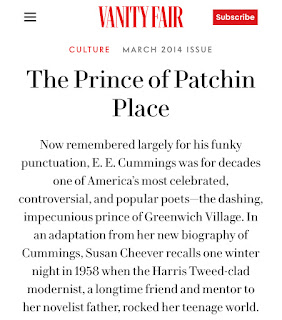Brian Boyd shared in Vladimir Nabokov,The American Years that when Nabokov taught at Stanford his evenings were often spent attending formal parties and playing chess with Henry Lanz, the head of the Slavic department. Nabokov found Lanz "...delicate, cultured and talented." In addition, Nabokov found that Lanz was a nympholept (i.e., a person seized with a frenzy of erotic emotion) who would "...drive off on the weekends, neat and dapper in his blazer, to orgiastic parties with nymphets." Now the question is, did Nabokov ever attend any of those parties with Lanz?
And who was one of Nabokov's favorite painters? Based on my leading question, you may have been able to guess none other than Balthus. Nabokov shared in In Strong Opinions, "The aspects of Picasso that I emphatically dislike are the sloppy products of his old age. I also loathe old Matisse. A contemporary artist I do admire very much, though not only because he paints Lolita-like creatures, is Balthus." Furthermore, Eric Naiman wrote in Nabokov, Perversely that a painting in Pnin, "Hoecker's 'Girl with a Cat'", may have been a reference to Balthus' "Jeune Fille au Chat".
 |
| Balthus' "Jeune Fille au Chat" |
Nabokov was asked in a 1964 Playboy interview, "Are there any contemporary authors you do enjoy reading?" Nabokov replied, "I do have a few favorites—for example, Robbe-Grillet and Borges. How freely and gratefully one breathes in their marvelous labyrinths! I love their lucidity of thought, the purity and poetry, the mirage in the mirror."
Unsurprisingly, Robbe-Grillet writes about nymphets too. Here's an exemplary excerpt from his Recollections of the Golden Triangle [French: Souvenirs du Triangle d'Or]:
To celebrate her 17th birthday, Caroline's father took a whole box at the Opera House. Caroline was commanded to face the stage while straddling two armless red-velvet chairs before her father "...pressed himself shamelessly against her buttocks in order to caress her in greater comfort...The insidious fingers are no longer satisfied with stroking...They pass back and forth in wave after wave, tirelessly, over the bivalvular lips...One tiny, fragile rock resists and stiffens..."
And what about Aleksandr Pushkin, who was one Nabokov's favorites poets. The Paris Review revealed that Nabokov spent two months in Cambridge working on the English translation and commentary of Eugene Onegin for over 17 hours per day. In the novel in verse, the poet Lensky invited 26-year-old dandy Eugene Onegin to dinner with his fiancée, the nymphet Olga, and her family. During the dinner Tatyana, Olga's 13-year-old older sister, became very infatuated with Onegin but her innocent love for the older man was (initially) unrequited.
Wait. Let's not forget about Nabokov's short stories. According to Naiman, Nabokov wrote “Skazka” in 1926 before it was published in Rul', a Berlin emigre newspaper that was founded by his father. In the story, on his ride to work, Erwin habitually gazes through the tram's window and picks girls for his imaginary harem. However, the young man gains the opportunity for his dreams to come true after he meets Frau Monde, a female Devil who promises Erwin that he can have all the girls he wants upon “cushions and rugs” in “a villa with a walled garden” but that it's “essential and final” that he selects an odd number of girls between noon to midnight.
The next day Erwin starts collecting slave girls. Here's a partial list:
A maiden in a white dress with chestnut hair and palish lips who was playing with her “fat shaggy pup”
“[T]wo young ladies-sisters, or even twins...Both were small and slim...with saucy eyes and painted lips.” Erwin referred to the Twins as “Gay, painted, young things.”
A lady who “...was lovely, hatless, bobhaired, with a fringe on her forehead that made her look like a boy actor in the part of a damsel.
A “beautiful in a drab, freckled way” wench who worked at a cheap restaurant that Erwin frequented on Sundays.
A girl with gray eyes with a slight slant and a thin aquiline nose that wrinkled when she laughed
A girl at a small amusement park who wore a scarlet blouse with a bright-green skirt
Four girls in jerseys and shorts, “...magnificent legs, naked nearly up to the groin...” inside the amusement park's arcade.
“A child of fourteen or so in a low-cut black party dress .” She was walking with a tall elderly man who was a “...famous poet, a senile swan, living all alone in a distant suburb”
I won't reveal who last girl was, but I will share her response to Erwin which was, “You ought to be ashamed of yourself...Leave me alone.” Her response was due to “...that which changes a man's life (i.e., genital) with one divine stroke...”
When Nabokov translated the story before it was published in Playboy (1974) and Details of a Sunset (1976), he aggressively titled it “A Nursery Tale” and noted in Tyrants Destroyed and Other Stories that when he was translating the story he was “...eerily startled to meet a somewhat decrepit but unmistakable Humbert escorting his nymphet in the story I wrote almost half a century ago.”
Thus, was Nabokov a hebephile\ephebophile? Clearly, he was and according to Matt Ridley's New York Time's Notable Book The Red Queen all men are. But did Nabokov ever have an age-discrepant relationship? We may never know.








